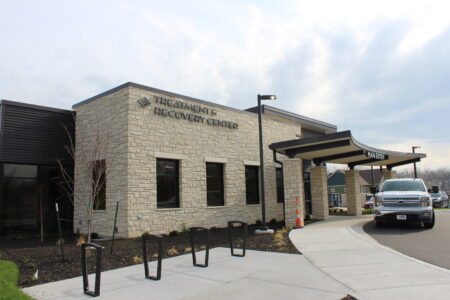County commissioner says Bert Nash needs immediate financial help from county, asks what is the plan if it can’t make payroll

photo by: Austin Hornbostel/Journal-World
The Treatment and Recovery Center, located on the Treatment and Recovery Campus of Douglas County at 1000 W. Second St., is pictured on Friday, April 15, 2022.
Douglas County Commissioner Gene Dorsey is concerned that a crisis is “imminent” at Bert Nash Community Mental Health Center, and he thinks the county ought to provide some immediate financial assistance.
Dorsey made that request to fellow county commissioners at Wednesday evening’s meeting and was largely rebuffed, but he told the Journal-World Thursday morning that he’s undeterred. He said he will continue to seek a way to provide financial assistance to Bert Nash ahead of the conclusion of the county’s 2026 budget process, which runs from June through August.
“I will keep pushing for assistance from any source available,” Dorsey told the Journal-World.
Dorsey’s efforts come on the heels of Bert Nash’s Wednesday announcement that it would cut 6% to 8% of its workforce — math that likely equates to about 30 employees — and would implement temporary salary reductions for many of its executives.
Dorsey specifically asked county commissioners to place on the agenda for next week’s meeting an item to consider modifying the contract that the county has with Bert Nash to run the county-owned Treatment and Recovery Center, which provides emergency mental health care for the community.
That contract charges Bert Nash about $890,000 a year in rent to occupy the county-owned building, Dorsey said. The contract also places a cap on how much assistance the county will give Bert Nash to provide care for indigent patients who seek services at the center. Dorsey said he wants the county to consider eliminating the rent payment and modifying the cap for indigent support.
But his fellow commissioners — Commissioner Shannon Reid wasn’t present — pushed back on the request. Commissioner Karen Willey said she was uncomfortable placing the item on next week’s agenda, given that Bert Nash officials had not specifically made the request.
Dorsey, on Wednesday, responded that now is no time to wait or to become consumed by matters of process. Dorsey — who served as a board member for Bert Nash for six years prior to being elected a county commissioner — said he was worried that Bert Nash may be forced to essentially close due to a lack of finances.
“I’m concerned they don’t have enough cash to make payroll, coming soon,” Dorsey said.
“I think those are questions for Bert Nash,” Willey said in response to a question about what the plan would be if the organization had to close or were significantly diminished.
“Yeah,” Dorsey said in response. “That’s why I requested that they come here next week.”
Commissioners ended the meeting without making a commitment to consider the changes to Bert Nash’s contract, as requested by Dorsey.
Bert Nash CEO Patrick Schmitz did not return a message on Thursday morning seeking comment. A fact sheet provided to employees on Wednesday characterized Bert Nash’s situation as one of “financial exigency,” which is a term used by organizations when they believe their ability to operate is threatened.
Bert Nash officials have previously been open about the financial challenges facing the nonprofit organization. In February, Schmitz attended a County Commission meeting and reported on an expected $3.2 million revenue gap for 2025. He told county commissioners then that he expected Bert Nash would need more county funding in the future.
After Wednesday’s layoff announcement Dorsey is worried the situation has gotten worse. He said he became particularly concerned when he learned that Bert Nash’s endowment fund provided a $1.35 million cash infusion to Bert Nash to cover operating expenses. Dorsey said, based on his past knowledge of serving as a board member, that he believes the $1.35 million represented nearly all of the discretionary funds available to the endowment. He said the $1.35 million infusion is far bigger than the normal allocation Bert Nash receives from the endowment.
“I think there is an imminent crisis,” Dorsey said of his thoughts upon hearing of the endowment funding.

photo by: Chad Lawhorn/Journal-World
Erica Anderson and Gene Dorsey are the two new Douglas County Commissioners who filled seats created when the commission expanded to five members. The pair visited prior to Monday’s oath of office ceremony.
Dorsey said he is requesting that the county consider changing Bert Nash’s contract to run the Treatment and Recovery Center for multiple reasons. He said it would be simple to do, and it is a responsibility of the county to ensure it has a financially sound entity operating the county-owned facility. The county struggled to find a provider to run the facility before reaching an agreement with Bert Nash. It is unclear who would run the center if Bert Nash were unable to do so. County taxpayers invested about $11 million to build the center, which opened in 2022.
Additionally, Dorsey argues that it would be appropriate to change the contract because the operations of the Treatment and Recovery Center are one of the factors putting a financial strain on Bert Nash. That’s in part because there has been a major change in the Medicaid program since the center opened. After the pandemic, about 114,000 Kansans lost their Medicaid coverage. Medicaid — the federal and state insurance program for the poor — was counted on to be a major funder for the Treatment and Recovery Center, as Medicaid will pay for certain types of mental health services. Now, that is happening at a much smaller rate.
Dorsey said that is a good reason to adjust the contract with Bert Nash.
“We had no experience when it was written,” Dorsey said. “Now we have experience and understand the situation better. There are no bad guys here. It is everybody trying to do good work for the community, but it is all brand new.”
Dorsey said he is confident the county could find the money to alter the Bert Nash contract. He said money likely could be pulled from the county’s dedicated mental health sales tax fund. That fund had a fund balance of about $18 million at the end of 2024, according to county budget documents.
However, using that money might require a philosophical change in direction for the county commission. That fund has more frequently been used for building expenses for mental health projects, rather than funding ongoing operational costs. Dorsey said he would welcome a discussion on how that fund should be used.
“I’m not saying it couldn’t be used for that,” Dorsey said of funding mental health building projects, “but operations need to be taken care of first.”
Dorsey’s fellow county commissioners said they weren’t opposed to having that discussion, but said it should come as part of the county’s regular budget process during the coming months. They also said that would be the time for the county to consider changing the Bert Nash contract as well.
Whether that contract gets changed, though, may not be the only question facing Bert Nash. The organization has announced plans for two major expansions — a more than $10 million supportive housing facility along Rockledge Road in northern Lawrence, and a $12 million project to renovate the former LMH Health South building at Clinton Parkway and Kasold Drive into a facility for youth who are experiencing a mental health crisis.
In an email to Bert Nash employees notifying them of the layoffs and restructuring, Emily Farley, chief advancement officer for Bert Nash, said the Youth Recovery Center remained a top priority, and was financially feasible because children are insured at much higher rates than adults.
The email didn’t address the status of the supportive housing project, which would serve adults with persistent mental health needs.






